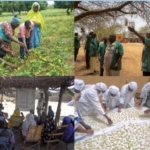


Groundswell International
Association Nourrir sans Détruire (ANSD), Institute for the Environment and Agricultural Research (INERA/Fada), Association Minim Song Paanga (AMSP)
Burkina Faso
8/2016—8/2019
In the Eastern, North Central and East Central Regions of Burkina Faso, agriculture of sorghum, millet and cowpeas and animal husbandry are the foundation of the rural livelihoods. Significant decline in soil fertility and productivity in recent years have been caused by: increased population pressure on the land, reduction or elimination of the fallowing practices traditionally used to maintain soil fertility, and climate change. This has caused increases of food and nutrition insecurity of the most vulnerable rural households. Research has increasingly demonstrated the effectiveness of agroecological intensification (AEI) techniques to improve soil fertility, food production, and diversify farming and livestock systems for better food security. In 2012, the NGO “Groundswell International” together with the NGO “Association Nourrir Sans Detruire” (ANSD), the farmer organization “Association Minim Song Paanga” (AMSP) and the National Institute of Environmental and Agricultural Research (INERA) of Burkina Faso contributed to AEI in these regions of Burkina through a three-year project supported by the McKnight Foundation of “Farmer-led agroecological intensification”. This research initiative, now completed, examined research questions on how farmers could test adopt and spread AEI techniques. As a result, 4,000 farm households in four communes across two buffer agro-climatic zones undertook on-farm trials, farmer field schools, trained volunteer farmer experimenters, promoted farmer-to-farmer training, increased access to improved seed, established village AEI committees and strengthening the organizational capacity of farmers’ associations. Data on the agronomic effects collected to date, including from farmers themselves, show promising results. There is an urgent need to adapt and continue spreading proven AEI techniques to meet the needs of heterogeneous small-holder farm households in the buffer agro-climate zones I and II. An initial review of the three-year project supported by the McKnight Foundation indicates serious gaps in knowledge about how to promote AEI to more effectively reduce food and nutrition insecurity of diverse social categories, including women and more vulnerable households. Key research questions to be addressed include how to effectively integrate equity/women’s empowerment, nutrition, and small-scale livestock into the current AEI approach. Over three years, Groundswell International and its existing partners of AMSP, ANSD, and INERA will undertake action research in 16 pilot villages to address these knowledge gaps, while continuing to spread already proven AEI techniques, adapting them to meet needs of specific groups within 80 villages already reached in Phase 1. These are fully consistent with CCRP strategies, but shift to emphasize equity, inclusiveness, nutrition and strengthening of social capital, to complement existing strategies to strengthen productivity/scaling.
Expected outputs. Phase 2 is expected to generate new knowledge and context-specific documentation that will consolidate and build the evidence base on the effects of AEI approaches on:
Expected Outcomes. As these knowledge-related outputs are generated within the 80 villages and across 4 communes, they will contribute to the following outcomes in Phase 2:
